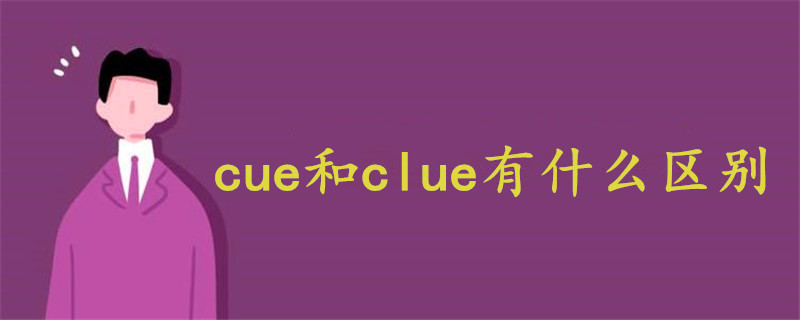cue和clue有什么区别:含义不同、用法不同、词性不同。cue可作名词和及物动词,含义为“暗示”、“信号”、“球杆”、“弹子棒”、“给某人暗示”;clue可作名词和动词,含义为“线索”、“解答提示”、“为…提供线索”。

一、cue的含义及用法
cue主要用作名词和及物动词,意为暗示;提示;信号;(戏剧的)提示,尾白;(台球等的)球杆,弹子棒;给(某人)暗示(或提示)。
例句:Jon's arrival was a cue for more champagne.
乔恩一来就意味着要喝更多的香槟酒了。
She stood in the wings and waited for her cue to go on.
她站在舞台侧面等待着出场的提示。
Can you cue me when you want me to begin speaking?
你要我开始讲话时能给我暗示一下吗?
He read the scene, with Seaton cueing him.
在西顿的提示下,他念了这一场的台词。
That was the cue for several months of intense bargaining...
那意味着几个月的激烈谈判开始了。
Their youngest brother was nine when he picked up a cue for the first time.
他们最年轻的弟弟第一次玩台球时才9岁。
二、clue的含义及用法
clue主要用作名词、动词,作名词时意为“线索;(故事等的)情节”,作动词时意为“为…提供线索;为…提供情况”。
例句:Diet may hold the clue to the causes of migraine.
饮食习惯有可能揭示偏头痛的起因。
The vital clue to the killer's identity was his nickname, Peanuts.
查明杀手身份的重要线索是他的外号叫“花生”。
I haven't a clue what I'll give Carl for his birthday next year.
我不知道明年卡尔过生日我该送什么。
The police think the videotape may hold some vital clues to the identity of the killer.
警方认为那盘录像带可能录有能确认凶手身份的一些重要线索。
There was a vast distance between psychological clues and concrete proof
心理提示和确凿证据之间相差甚远。












